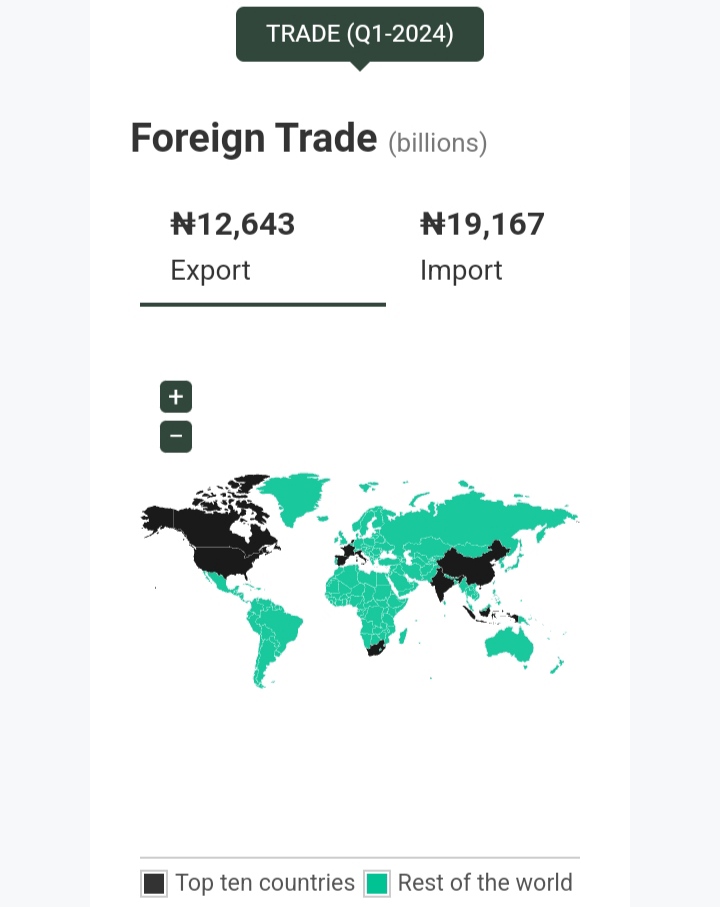Nigeria’s economy is facing significant challenges due to a foreign trade deficit of ₦7 billion, as reported by the National Bureau of Statistics (NBS). This growing trade imbalance, where the country’s imports amount to ₦19 billion and exports total only ₦12 billion, has far-reaching effects on the nation’s economic stability. The trade deficit not only weakens the Naira but also contributes to inflation, reduced domestic production, and higher debt. In this blog post, we’ll explore the impact of Nigeria’s foreign trade deficit and provide solutions for achieving a trade surplus to boost the economy.
What is a Foreign Trade Deficit?
A foreign trade deficit occurs when a country’s imports exceed its exports, meaning it is spending more on buying goods and services from abroad than it earns by selling its own products. For Nigeria, this deficit has reached ₦7 billion, a concerning figure that poses risks for the economy.
Impact of Nigeria’s ₦7 Billion Trade Deficit
- Devaluation of the Naira: A trade deficit leads to an increased demand for foreign currencies, especially the US dollar, to pay for imported goods. This puts pressure on the Naira, resulting in its devaluation. As the value of the Naira declines, it becomes more expensive for Nigerians to buy imported goods, further increasing the cost of living.
- Rising Inflation: A weak Naira coupled with heavy reliance on imported goods leads to imported inflation. Essential products like food, fuel, and raw materials become more expensive, directly affecting consumers. The current inflation rate in Nigeria has surged to over 25%, largely driven by external trade imbalances.
- Stifled Domestic Production: When Nigeria imports more than it exports, local industries face stiff competition from foreign products. This can result in reduced domestic production, fewer job opportunities, and slower economic growth. Nigeria’s manufacturing sector, in particular, struggles to compete with cheaper, often more technologically advanced, foreign goods.
- Increased National Debt: To finance its growing import bills, Nigeria may have to borrow more money from foreign lenders, leading to increased debt. With limited export earnings, paying off these debts becomes challenging, further straining the country’s finances.
- Vulnerability to Global Economic Shocks: Nigeria’s dependence on imports makes it vulnerable to global economic disruptions. Any increase in global prices, geopolitical tensions, or supply chain disruptions can lead to higher costs for Nigeria, impacting both businesses and consumers.
Proposed Solutions: How Nigeria Can Achieve a Trade Surplus
To address these challenges and move toward a trade surplus, the Federal Government must implement strategic measures to boost local production, reduce dependency on imports, and promote exports. Here are some solutions:
- Diversifying the Economy Beyond Oil: Nigeria’s export sector is heavily reliant on crude oil, which makes the country vulnerable to fluctuations in global oil prices. The Federal Government should invest in diversifying the economy by promoting sectors like agriculture, technology, and manufacturing. This would expand the range of exportable goods and services, boosting foreign exchange earnings and reducing the trade deficit.
- Investing in Infrastructure: Poor infrastructure, such as inadequate roads, unreliable electricity, and limited access to markets, hinders local production. By improving infrastructure, the government can make it easier and cheaper for businesses to produce and export goods. Investments in power generation, transportation networks, and digital infrastructure will enable manufacturers to operate efficiently and compete globally.
- Encouraging Local Production and Reducing Imports: The government can introduce policies that incentivize local production, such as tax breaks, grants, and favorable lending conditions for small and medium-sized enterprises (SMEs). Reducing the importation of goods that can be produced locally, such as food and textiles, would also help address the trade deficit. Import substitution policies can play a key role in encouraging Nigerians to buy made-in-Nigeria products.
- Strengthening the Agricultural Sector: Agriculture has the potential to become a major export sector for Nigeria. The Federal Government should support farmers by providing access to modern farming equipment, improved seed varieties, and agricultural financing. By increasing agricultural production and exports, Nigeria can reduce food imports and boost its export earnings.
- Promoting Non-Oil Exports: Nigeria should focus on promoting non-oil exports such as solid minerals, textiles, processed foods, and services. Export promotion agencies can help Nigerian businesses access international markets by providing marketing support, reducing trade barriers, and offering export incentives.
- Enhancing Trade Agreements: Nigeria should negotiate favorable trade agreements with key trading partners to boost its export markets. By leveraging regional and global trade agreements, the country can increase market access for its goods, particularly in sectors where it has a competitive advantage.
- Strengthening the Value Chain in Key Sectors: Nigeria needs to invest in value addition for its raw materials. Instead of exporting crude oil, cocoa, or minerals in raw form, the government should encourage local processing industries that add value to these commodities. This would increase the export value of Nigerian products and create jobs within the country.
- Financial and Technological Support for SMEs: Small and medium-sized enterprises are crucial for boosting local production and exports. The government should provide SMEs with access to affordable financing, technology, and skills development programs. This will enable them to scale their operations and contribute to Nigeria’s export growth.
Conclusion: A Path Toward Economic Stability
Nigeria’s ₦7 billion trade deficit is a reflection of deeper structural issues in the economy. To reverse this trend and achieve a trade surplus, the Federal Government must implement policies that promote local production, encourage exports, and reduce dependency on imports. By diversifying the economy, investing in infrastructure, and supporting key sectors like agriculture and manufacturing, Nigeria can build a more resilient economy with a positive trade balance. In the long run, these efforts will strengthen the Naira, create jobs, and improve the standard of living for all Nigerians.
Through these proactive measures, Nigeria can move toward a trade surplus, ensuring economic growth and stability for the future.

